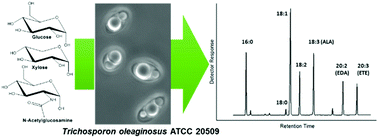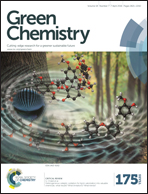Genetic engineering and production of modified fatty acids by the non-conventional oleaginous yeast Trichosporon oleaginosus ATCC 20509†
Abstract
The oleaginous yeast Trichosporon oleaginosus ATCC 20509 can accumulate up to 70% (w/DCW) triglycerides when cultivated on chemically diverse agricultural or food waste streams. In contrast to other lipogenic yeasts T. oleaginosus is able to efficiently convert constituents of hemicellulose and chitin hydrolysates into lipids. This study focused on establishing the genetic accessibility of T. oleaginosus aimed at manipulating lipid biosynthesis in order to generate high value lipids from waste streams. We demonstrate the first transformation protocol for T. oleaginosus based on Agrobacterium tumefaciens. Strong heterologous gene expression of a codon optimized YFP reporter protein was achieved using the constitutive promotor from the endogenous glyceraldehyde-3-phosphate dehydrogenase gene. Subsequently, we evaluated the ability of T. oleaginosus to generate non-natural fatty acid profiles by heterologous expression of several fatty acid modifying enzymes. De novo lipid generation of these recombinant strains was evaluated on diverse carbon sources. Compared to the wild type, recombinant yeast strains showed an increase of α-linolenic acid production from 2.8% to 21% with respect to the total cellular fatty acid content (TFA). Further, we designed yeast strains able to generate the non-native, polyunsaturated very long chain fatty acids eicosatrienoic (16% TFA) and eicosadienoic acid (9% TFA), respectively. Alternatively, T. oleaginosus was engineered to produce the non-native (E-10, Z-12) conjugated linoleic acid, which was generated up to 2.6% TFA. This work demonstrates, that T. oleaginosus ATCC 20509 can be used as versatile biotechnology platform to transform industrial waste streams into designed, high value fatty acids.


 Please wait while we load your content...
Please wait while we load your content...